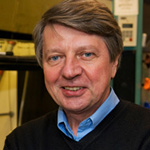Professor Receives Elite Wolf Prize in Chemistry
By Jocelyn Duffy
Krzysztof Matyjaszewski, the J.C. Warner Professor of the Natural Sciences in the Mellon College of Science, has  been named a recipient of the 2011 Wolf Prize in Chemistry from Israel’s Wolf Foundation.
been named a recipient of the 2011 Wolf Prize in Chemistry from Israel’s Wolf Foundation.
The Wolf Prize is given every year in four out of five categories, in rotation: agriculture, chemistry, mathematics, medicine and physics. One out of every three Wolf Prize Laureates in chemistry, physics and medicine have later received a Nobel Prize.
“The Wolf Prize is a distinguished honor received by only the most elite scientists and artists in the world,” said Carnegie Mellon President Jared L. Cohon. “Kris certainly belongs in this category. His work is nothing short of visionary.”
Matyjaszewski will be recognized with two other noted chemists, Stuart Alan Rice of the University of Chicago and Ching Tang of the University of Rochester, for their “deep creative contributions to the chemical sciences in the field of synthesis, properties and an understanding of organic materials.” They will accept the award from the President of the State of Israel and the Israeli Minister of Education at a special ceremony at the Israeli Parliament on May 29.
“I feel very flattered by this special recognition from the Wolf Foundation. This award belongs not only to me, but also to the more than 50 graduate students, 100 postdocs and the countless chemists, materials scientists, and chemical, biomedical and civil engineers among CMU’s faculty that I have had the pleasure of collaborating with throughout the years,” Matyjaszewski said.
The Wolf Prize Committee commended Matyjaszewski for his “groundbreaking research in synthesis of organic materials, and in particular, in the critical area of controlled, efficient, safe and economical polymer synthesis.”
Matyjaszewski invented the process of atom transfer radical polymerization (ATRP), one of the most effective and most widely used methods of controlled radical polymerization (CRP). This method allows scientists to create polymers from many different component parts, called monomers, in a piece-by-piece fashion, precisely controlling the polymer’s composition. By assembling polymers in such a manner, scientists have been able to create a wide range of new materials with highly specific, tailored functionalities. This technology also allows for the production of “smart” materials that can respond to altered environments, such as changes in pressure, acidity, light exposure or other variables.
“ATRP has made polymerization easier, less expensive, and more effective, changing how we make materials from paints to plastics and adhesives,” said Fred Gilman, dean of CMU’s Mellon College of Science. “Kris continues to strive to improve the process and even given the worldwide recognition of his achievements, I would bet the best is yet to come.”
Polymers created using ATRP have been used for coatings, adhesives, lubricants, cosmetics and electronics and are currently under investigation for use in
the medical and environmental fields. In 2006, ATRP formed the basis for a Carnegie Mellon spin-off company called ATRP Solutions that uses the technology to develop next-generation materials for evaluation by their customers in their targeted markets.
Matyjaszewski came to Carnegie Mellon in 1985 and was appointed the J.C. Warner Professor of the Natural Sciences in 1998. While at Carnegie Mellon,Matyjaszewski founded the Center for Macromolecular Engineering, served as head of the Department of Chemistry from 1994 to 1998, and was named a University Professor in 2004.
Matyjaszewski is the second Carnegie Mellon professor to receive a Wolf Prize. The late John Pople received the 1992 Prize in Chemistry for his contributions to theoretical chemistry. Pople went on to receive the Nobel Prize in Chemistry in 1998.
Krzysztof Matyjaszewski is the J.C. Warner Professor of the Natural Sciences in the Mellon College of Science.
